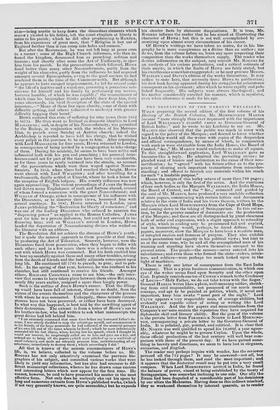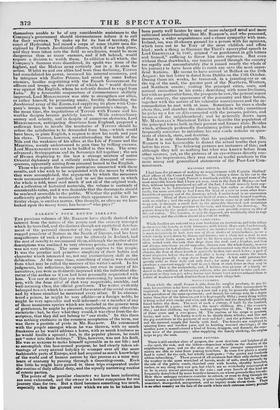THE DESPATCHES OF THE MARQUIS WELLESLEY.
WHEN preparing the second edition of the first volume of his History of the British Colonies, Mr. MONTGOMERY MARTIN became " more strongly than ever impressed with the importance of Lord WELLESLEY'S eventful career as Governor-General of British India ;" and he wrote to his Lordship to say so. Mr.
MARTIN also observed that the public was much in error with
regard to the policy of the Marquis; and desired to know whether his Lordship would aid the writer with copies of the despatches and official correspondence, by means of which, in conjunction
with such as were obtainable from the India House, the Board of Control," &c.," Mr. MARTIN would undertake to make all square.
To this straightforward application, Lord WELLESLEY gave as business-like a reply. He admitted the prevailing errors ; he pleaded want of leisure and inclination as the cause of their non- rectification ; he " agreed " with his future editor as to the pro- priety of clearing such important transactions from misunder- standing; and offered to furnish any materials within his reach for such " a laudable purpose."
Hence the origin of this bulky octavo of more than 700 pages ; which, however, is only the first of the series. And the exertions of four such bodies as the Marquis WELLESLEY, the India House, the Board of Control, and the " Sze.," animated and guided by the soul of Mr. MARTIN, have produced a very readable collection of state papers, commencing with certain letters and documents- relative to the state of India and his views thereon, written by the Marquis (then Lord Mortsusicrors) from the Cape of Good Hope, and coming down to the taking of Seringapatam. In this collec- tion, by far the greater number of documents are the production of the Marquis; and these are all distinguished by great clearness both of order and expression, with a slight approach to rotundity of style, which in reading may be pronounced full and explicit, but in transcribing would, perhaps, be found diffuse. These papers, moreover, show the Marquis to have been a resolute man, of mingled caution and firmness of purpose. They also exhibit much penetration and sagacity in his political views ; but hint to us at the same time, why he and all the accomplished men of his training and standing have shown themselves unequal to the present crisis. The people—the masses—never entered into his calculations; and even those who formed the state—rulers, minis- ters, and soldiers—were perhaps too much looked upon in the light of machines. There is only one letter of consequence from the East India Company. That is a plain business communication, in which one eye of the writer seems fixed upon Security and the other upon Cost. It plainly reminds one too of CONDE'S remark to the Confessor of Louis—" Holy Father, we do not take towns with the finger." General HARRIS writes likes a plain, well-meaning soldier, shrink- ing from civil responsibility, not possessed of too much moral courage, and apt to be puzzled at politics, which, if novel and important, keep him awake " most part of the night." Lord CLIVE appears a very respectable man, of average abilities, but evidently not capable either of acting or writing like Lord WELLESLEY. And the few papers and memorandums from the Company's servants sustain the reputation they have acquired for diplomatic skill and literary ability. But the gem of the volume is the private letter from FREDERICK NORTH to Lord MORNING-- TON, accompanying a private letter to the Governor-General of India. It is polished, gay, pointed, and satirical. It is clear that Mr. NORTH was well qualified to spend his 10,0001. a year agree- ably, whatever he might be to govern Ceylon. Upon the whole, these official productions of the last century will well bear com- parison with those of the present day. if we have gained some- thing in brevity and directness, we seem to have lost in elegance, animation, and English. The reader may perhaps inquire with wonder, has the reviewer perused all the 712 pages ? It may be answered—not all, but he has looked through them, and read the most important; and it appears that the historical result may be put into a very small compass. When Lord MORNINGTON arrived in India, be found the balance of power, aimed at being established by the treaty of Seringapatam, was somewhat inclining to one side. Our ally the Zizam had been despoiled of a considerable part of his dominions by our allies the Mahrattas. Having done us this indirect mischief, they so weakened themselves by internal quarrels, as to render
themselves unable to be of any considerable assistance to the Company's government should circumstances induce it to call
for their services. To make up for its loss of territory, the court of Hyderabad had raised a corps of some 10,000 men dis- ciplined by French Jacobinical officers, which if war took place, and they wore taken into the field as auxiliaries, would be more dangerous than as many enemies, and if left behind, would require a division to watch them. In addition to all which, the Company's finances were disordered, its ajedit was none of the highest, and the Madras army certainly not in a fit state for action. Whilst we and our allies had been thus declining, TIPPOO had consolidated his power, increased his internal resources, and by intrigues with Native Princes, had raised up some Indian enemies, besides negotiating with the French Government for officers and troops, on the arrival of which he " would declare war against the English, whom he ardently desired to expel from India." By a favourable conjuncture of circumstances skilfully improved, Lord MORNINGTON was able to strengthen our allies, or rather himself, by promoting amity, forcibly disbanding the Jacobinical army of the Zizam, and supplying its place with Com- pany's troops, to be maintained at that potentate's charge. In the mean time, the negotiations of TIPPOO with France and his warlike designs became publicly known. With extraordinary secrecy and celerity, and in despite of numerous obstacles, Lord MORNINGTON, anticipating directions from England, prepared a sufficient force to invade the territories of TIPPOO should he refuse the satisfaction to be demanded from him,—which would have been, in plain English, a request to draw his teeth and pare his claws. TIPPOO, however, notwithstanding the battle of the Nile and the weakness of his allies at the Isle of France and the Mauritius, merely endeavoured to gain time by trilling excuses. Lord MORNINGTON was not to be battled in this way. The army advanced; Seringapatam and its Sovereign fell together ; the son of HYDER displaying to the last a strange mixture of native Oriental diplomacy and a sullenly reckless disregard of conse- quences, apparently arising from personal hatred to the English.
Those who require the minute particulars connected with these results, and who wish to be acquainted with the means by which they were accomplished, the arguments by which the measures were recommended or justified, and to see the manner in which the whole is told, must read much if not all of the original work. As a collection of historical materials, the volume is certainly of considerablevalue, and it was desirable that the documents should be rendered accessible to the public. Whether the public will be sufficiently grateful to remunerate their appearance in this par- ticular shape, is another matter. Our thought, as often as we have looked upon the massy tome, has been—" who pays ?"



























 Previous page
Previous page